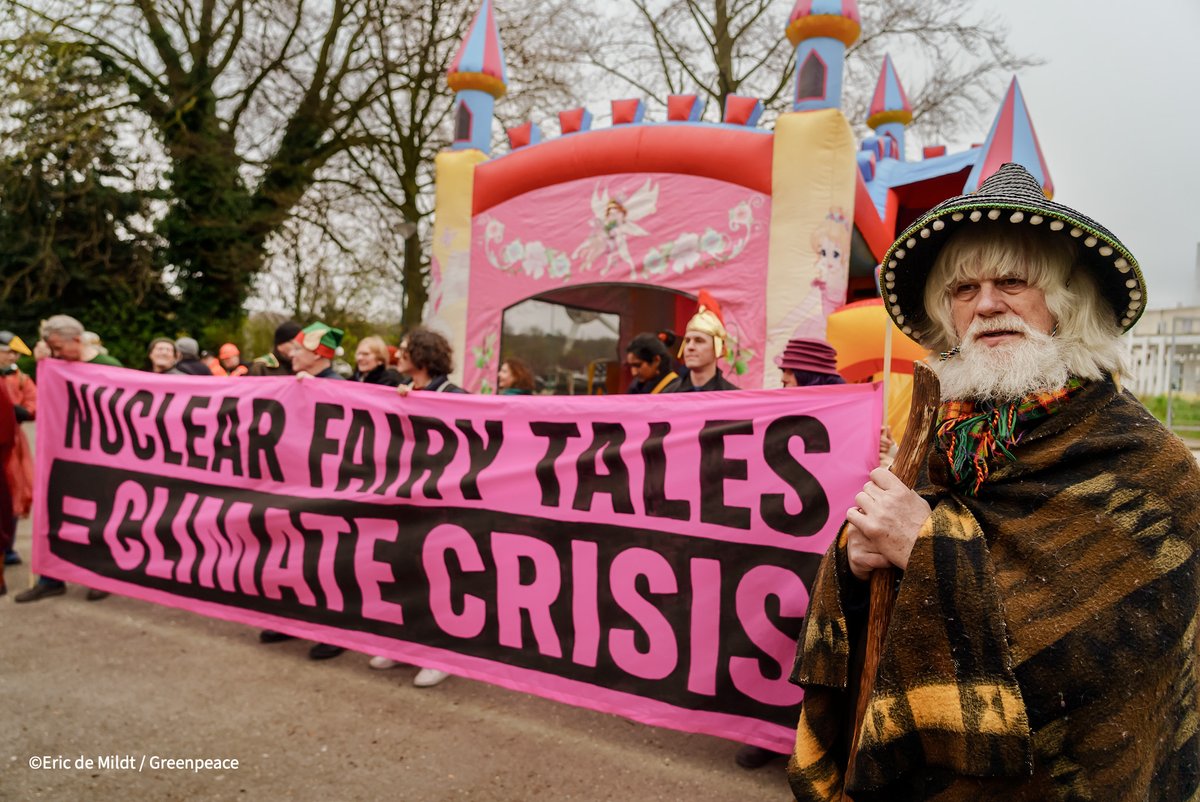
On March 21, 2024, more than 600 civil society groups across the globe working on climate action, including 130 from Canada, launched a declaration in Brussels, Belgium, stating that nuclear power expansion is not a solution to the climate crisis.
Emma Fackenthall wrote about it for the NB Media Co-op, HERE.
Here are several articles in the European media about the rally where the statement was launched in March:
- Green Groups Protest ‘Nuclear Fairy Tale’ in Brussels
- Green groups reject nuclear renaissance as governments seek climate fix
- ‘Nuclear fairytale’: Greenpeace activists block delegations at Brussels nuclear summit
- Lutins et magiciens dénoncent le « conte de fées » nucléaire à Bruxelles
The civil society statement, Safe, affordable and climate-friendly energy for all, was organized by Climate Action Network Europe. The statement is HERE, including the names of the 600+ groups that signed.
The list of 130 Canadian groups, HERE, includes the Climate Action Network Canada. The Canadian media release is HERE.
The groups signed on to the statement below:
The world faces multiple social, environmental and economic crises. People are worried about the cost of living, extreme weather events linked to climate change, and their energy bills. Lobbyists and politicians at the nuclear energy summit will present building new nuclear power plants as the answer, but this does not pass a basic reality check.
New nuclear power is too slow to tackle the climate emergency.
Nuclear power plants under development have been severely delayed and won’t be able to meaningfully contribute to cutting carbon emissions this decade. Whereas greenhouse gas emissions must be drastically cut by 2030 to limit global temperature rise to less than 1.5 degrees, any new nuclear plants announced today would not be connected to the grid until well past this deadline. New nuclear power plants are a distraction which slows down the energy transition. A rapid shift away from fossil fuels should instead focus on building a 100% renewable energy system coupled with energy efficiency and measures to avoid excessive energy use. Together, these steps can meet the world’s energy needs in a way that is fair, environmentally friendly, and achievable.
Nuclear energy is much more expensive than renewables.
While nuclear projects face huge budget overruns and cancellations due to sky-rocketing costs, renewables are cheaper than ever before, declining sharply in relative costs compared to nuclear. New nuclear power plants are up to nearly four times as expensive as wind power, according to the 2023 World Nuclear Industry Status Report. Governments need to invest in proven climate solutions, such as home insulation, public transport, and renewable energy, rather than expensive experiments, like small modular reactors, which have no guarantees of actually delivering.
Nuclear power is dangerous.
From mining for uranium to radioactive waste, nuclear power production is a risk to people’s health, safety, and the environment. Nuclear power can be used as military targets and increase the risk of spreading nuclear weapons across the world, the use of depleted uranium and atomic bombs. The climate crisis also increases the risks involved in nuclear power, as increased heatwaves, droughts, storms, and flooding all pose significant threats to the plants themselves and to the systems that aim to prevent nuclear accidents.
We are living in a climate emergency. Time is precious, and too many governments are wasting it with nuclear energy fairy tales. What we demand is a just transition towards a safe, renewable and affordable energy system that secures jobs and protects life on our planet.
***
The statement was launched in Brussels at a global nuclear energy summit organized by the International Atomic Energy Agency, whose core function is to promote the nuclear industry globally. The big banks invited to the summit were not impressed by the pleas for funding by the nuclear industry. Here are some stories by the business news network Bloomberg:
Filling Nuclear Power’s $5 Trillion Hole Is Beyond the Banks
Europe’s Nuclear Revival Plans Risk Being Too Little, Too Late
Another pic:


